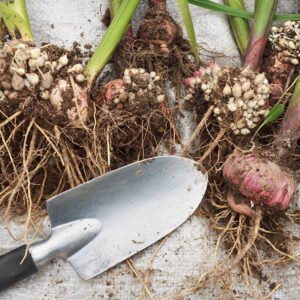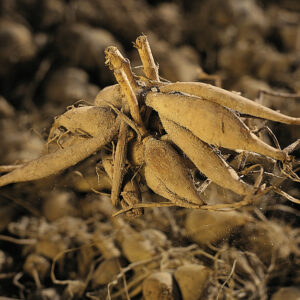Summer blooming bulbs provide a colorful and exotic feel to the garden. Popular summer blooming bulbs like dahlias provide blooms for quite a while. Gladiolus and calla lilies are some of the best cut flowers in summer. Summer standouts like canna lilies and elephant ears bring a feel of the tropics to any garden. Shade tolerant summer bulbs like begonias and caladium add color to containers and planting beds.
Many of these bulbs are best suited to warm climates and therefore won’t survive the freezing temperatures of cold winter climates. Therefore, when planting summer bulbs one has a choice to make. They can treat these bulbs like annuals or store summer bulbs in winter. If you prefer to store the bulbs and re-plant the following spring you will find helpful information on how to store summer bulbs in winter in the article below.
Storing Summer Flower Bulbs
What kind of bulbs need to be stored in winter?
Storing bulbs in winter depends on the climate they are growing in as well as the hardiness zone of the bulb. Summer blooming bulbs tend to prefer warmer climates. Therefore, when summer-blooming bulbs are grown in hardiness zones 3-7 they will need to be stored in winter. Popular tender summer blooming bulbs that require storage to protect from freezing winter temperatures are:
- Calla Lilies | Winter hardy in zones 7-10
- Canna Lilies | Winter hardy in zones 7-10
- Begonias | Winter hardy in zones 8-10
- Dahlias | Winter hardy in zones 8-10
- Caladium | Winter hardy in zones 9-11
- Gladiolus | Winter hardy in zones 8-10
- Elephant Ears | Winter hardy in zones 9-11
Note: The list above is the most popular summer-blooming bulbs. There are other spring-planted and summer-blooming bulbs that may require storage. If you are unsure whether or not something will need to be stored for winter check the hardiness zone range of each particular bulb to see if your zone is included or not.
When to dig up bulbs for winter storage
Tender bulbs are sensitive to frost and freezing temperatures. A light frost will not kill the tubers or rhizomes of summer blooming bulbs. It may cause damage to the foliage and flowers; however, the bulbs themselves will survive a light amount of frost. A deep freeze of several days and hours below 32 degrees will damage the bulbs beyond saving. Therefore, in fall pay attention to local temperatures. Make a plan to lift the bulbs from the ground before the first long-duration killing frost occurs.
Each region and year will be different. However, generally northern climates with harsh winters can expect this to happen in October to mid-November. Mild climates (hardiness zones 6 &7) that have cold enough winters may be able to wait until late November to early December to lift their bulbs. Therefore, it is important to follow the low temperatures in your region in autumn if you plan to lift and store the bulbs for winter.
Where to store summer bulbs in winter
During winter storage it is important to protect the bulbs from cold temperatures, excessive moisture, and excessive dryness. Therefore, they need to be stored in a location where they will not be impacted by these factors. One other consideration about storage location is that they should be protected from rodents and other critters that may find them desirable to eat in winter.
Summer bulbs can be stored in a basement, closet, or room in your house. Garden sheds and garages may not be the ideal place if freezing temperatures occur. Also, if rodents may be present in those locations storing summer bulbs in sheds, and garages should be avoided.
Preparing summer bulbs for storage
Summer blooming bulbs all look a little different. However, the general principles for winter storage can be applied to the various tender summer bulbs. Follow these steps to lift and prepare summer bulbs for winter storage:
- With a spade or sharp shovel carefully dig up the entire plant. Start a couple of inches from the plant to get as much of the root system as possible.
- Cut back any remaining foliage that is attached to the bulb. You may leave 1-2″ of foliage that is coming directly from the bulb. Over time the foliage will dry out. If too much foliage remains it could lead to issues with rotting.
- Shake off as much excess soil from the bulb and roots as possible.
- Prepare a location that the bulbs can dry outside for 1-2 days. This helps to remove as much moisture as possible before storing, which is important to prevent the bulbs from rotting.
- Store summer bulbs in a container that allows some airflow. Paper bags, plastic containers with ventilation as well as plastic or wooden crates all work well as storage containers.
- Add storage medium such as peat moss or sawdust to the storage container with the bulbs.
- Ideal storage temperatures are between 50 and 60 degrees
- Check the bulbs weekly to make sure they are not rotting or drying out.*
* If you notice the bulbs are starting to develop mold or soft spots remove them from the storage material. Allow the bulbs to dry out again and place in new dry storage material. If the bulbs appear to be drying out mist the bulbs lightly to add moisture. If either of these situations occurs it is important to check the condition of the bulbs frequently.
Storing summer bulbs in containers over winter
Bulbs that have been growing in pots all summer may be left in the containers over winter. The containers will need to be protected from freezing temperatures and moisture. Therefore, storing them in a garage or shed is not ideal. The containers with the bulbs can be stored in a basement, closet, or room in your home. When the container has been brought inside for winter storage you may remove the foliage or allow the plants to naturally go dormant by letting the foliage die back on its own. Summer bulbs like to be kept dry during the winter when in dormancy. Therefore, the bulbs should not be watered in winter.
If a sunny location is available in your home the pots can be moved to a location in late winter to early spring. The bulbs should start growing which will give them a jump start for the growing season. When the danger of frost has passed in your area the pots can be moved outside again.
Plan now to store summer bulbs in winter to create a long-lasting garden
Storing summer bulbs in winter takes a bit more work than the alternative of not storing the bulbs. If the bulbs aren’t stored for winter in most climates they will not survive the freezing temperatures. Therefore, new bulbs will need to be purchased the following spring. This can be somewhat fun as it means new plants and bulbs can be added to the garden. However, it can costly to choose not to store the bulbs in winter. Therefore, if you have certain bulbs you like in the garden and want to keep them year after year storing them is a great way to accomplish a long-lasting garden on a budget. Even if you store the bulbs, I highly suggest adding a couple new bulbs and perennials each planting season, as that is the most fun part of gardening!
More Helpful Summer Flower Bulb Articles Below:
Step-by-step advice for winter storage of dahlias.
New to gardening with summer flower bulbs? Check out our Summer Flower Bulb Basics
Timeless information can be found in our 20 Spring Flower and Garden Tips





